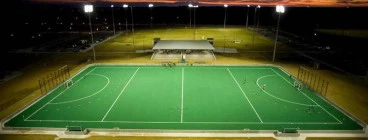- Ellenbrook, WA
- Business can travel to you
- Awards: #16 Most Popular in the Perth Region for 2024
Double Bass Classes & Lessons for Kids - the Perth Region
Western Australia (WA)
No exact matches found.
Other businesses in and around the Perth Region
Welcome to our dynamic community-oriented Australian soccer organization, where we're passionate about introducing children aged 2-12 to the joys of soccer in an environment that prioritizes fun, social interaction, and skill development. Our mission goes beyond just teaching the basics of the game; we're committed to instilling values of teamwork, sportsmanship, and personal growth in every child who participates in our programs. Serving the vibrant communities of the City of Swan and Stirling,... Read more
ATI martial Arts is a Taekwondo and Kickboxing based school. We offer martial Arts classes for 3-6 yrs we have our Little Dragons program which is a preschool age martial arts program that teaches , the fundamentals of Taekwondo and works on areas of child development crucial at this age, Social, emotional, physical development via our cleverly designed curriculum is what also makes ATI an industry leader in martial arts tuition. Our kid's Taekwondo program is based on Traditional Taekwondo , also... Read more
We are a very friendly but disciplined dance school and welcome all children to our classes. Most of the students are in primary school age but we are growing as they grow. Our students love Miss Keyarna so come along and see for yourself. Keyarna has a strong dance background in all genres of dance and share the teaching. We offer a range of classes to all age groups from 3 years. These include jazz & tap combination classes, acrobatics, from 8 yrs hip hop & from 7 years ballet/lyrical. Children... Read more
Smash Dance Company is one of Perth's leading performing arts companies providing each and every child under their guidance with strong technical training, industry knowledge & performance skills, as well as enhancing their personal development and confidence within a positive & supportive network. The SMASH team is full of creative & like-minded staff and students, all wanting to share in the joy and love of dance. Classes are designed to create a positive, safe and encouraging environment to nature... Read more
Mobile Laser Quest is a great choice for either boys or girls birthday parties or family fun days. There is no paint (other than camouflage face paint), and no 'bullets' are fired from the gaming guns, so no pain and no mess. This is an ideal fun activity for both boys and girls of all ages. Mobile Laser Quest comes to you. Our Backyard Battlefields is a complete live gaming kit that you can play at home. Our battle hardened staff bring everything you need for some urban combat entertainment, the... Read more
Grasshopper Soccer's goal is to teach kids how fun soccer can be! We aim to teach and develop soccer skills to children in a safe and enjoyable environment. Founded in 1990, we have 20 years of experience in sharing our love of sport with kids. Our programs are dynamic, growing and changing with us as we develop, ensuring children continue to love and enjoy this game. Grasshopper Soccer programs are designed for children aged 2-12 years. Each program provides a building block upon which children... Read more
23x Perth metro & Country locations, including: Albany, Armadale, Beechboro, Bassendean, Bayswater, Ballajura, Bicton, Bedford, Brentwood, Canning Vale, Cockburn, Como, Churchlands, Duncraig, Greenmount, Mt Lawley, Nedlands, North Beach, Ocean Reef, Subiaco, Thornlie, Woodvale, & Yokine. First Tae Kwon Do D teaches the original, non-competitive style of Taekwondo, which emphasises practical self-defence skills and the physical/mental development of our members. Our members train twice weekly... Read more
50% off Joining Fee + FREE Uniform!
Take advantage of our special Kick-Start offer to receive 50% off the joining fee and a FREE uniform. Kids, Teens and Family classes available with discounts for families training together!
Beechboro First Tae Kwon Do provides traditional martial art and practical self-defence training to children (6 years+), adolescents, and adults. Our members train twice per week, on Monday and Thursday nights at Kiara College Gym (368 Benara Rd, Kiara), and also have the option of attending other First Tae Kwon Do classes at other venues throughout the week at no extra cost. We provide a non-contact style of training, and do not participate in martial art competitions such as tournaments. Our... Read more
50% off Joining Fee + FREE Uniform!
Take advantage of our special Kick-Start offer to receive 50% off the joining fee and a FREE uniform. Kids, Teens and Family classes available with discounts for families training together!
50% off Joining Fee + FREE Uniform!
Take advantage of our special Kick-Start offer to receive 50% off the joining fee and a FREE uniform. Kids, Teens and Family classes available with discounts for families training together!
50% off Joining Fee + FREE Uniform!
Take advantage of our special Kick-Start offer to receive 50% off the joining fee and a FREE uniform. Kids, Teens and Family classes available with discounts for families training together!
Trial classes available
I am delighted to be accepting new students! Offering individual piano lessons, taught on a beautiful grand piano in Scarborough WA, Students of all ages and abilities are encouraged to come and enjoy the magic of music
About Us..... Metro Modelling & Dance Academy is the largest grooming, deportment, modelling & dance academy in Western Australia. With our main focus on developing student’s confidence, self- esteem and real life skills, Metro Modelling & Dance academy attracts a wide range of ages. With currently 4 studios in WA and over 500 current students, Metro has over 20 courses on offer catering for everyone from tiny tot 3 year olds to mums and baby classes, school self-esteem and anti-bullying workshops. Modelling Metro... Read more
WA's favourite multi-sport program for 18 month - 6 year olds. Our classes the teach fundamental movements of cricket, basketball, tee-ball, hockey, AFL, soccer, rugby, tennis, and athletics, with a new sport covered each fortnight. The classes are run completely indoors, with age-appropriate equipment, and are taught by patient and engaging coaches. All classes have a dedicated coach for the entirety of the term so that superstars can learn and succeed in a fun and consistent environment.... Read more
Belmont Junior Soccer Club (BJSC) is an active, family-friendly junior soccer club based in Cloverdale, Western Australia. We cater for children ranging from 4 to 18 years of age, with all teams entered into the appropriate Football West junior competitions. With more than 45 nationalities represented, we are one of the most diverse junior soccer clubs in Western Australia! With a history spanning over 30 years, we are a local fixture in the Belmont community. We are small but strong, and our... Read more
Description Mount Lawley First Tae Kwon Do provides traditional martial art and practical self-defence training to children (6 years+), adolescents, and adults. Our members train twice per week, on Tuesday and Thursday nights at St Patrick Church Hall , and also have the option of attending other First Tae Kwon Do classes at other venues throughout the week at no extra cost. We provide a non-contact style of training, and do not participate in martial art competitions such as tournaments. Our... Read more
Subiaco First TaeKwonDo provides practical self-defence training to children (6 years+), adolescents, and adults. Our members train twice per week, on Tuesday and Thursday nights at Palms Community Centre (cnr Nicholson and Rokeby Road), Subiaco. We provide a non-contact style of training, and our training focuses on both personal development and being realistically prepared for self-defence situations, with the clear recognition that avoidance (where possible) is a better option than being exposed... Read more
Swim Mechanix Success is a locally owned and operated business offering quality swimming lessons to children and adults at our Success and Byford locations. As an Endorsed Swim School with Royal Life Saving Society WA, our programs include specialised areas such as Infant Aquatics and Swim & Survive as well as Adult Learn to Swim & Swim Skills Development. Our Philosophy Swim Mechanix encourages people of all ages and abilities to develop good swimming practices, survival skills and a love... Read more
At Esteem we want to provide an environment that focuses on children's enjoyment and positive emotional development. Our classrooms are a supportive and collaborative environment that fosters healthy self-concept with the children. As a mother first and foremost, I wanted to provide an environment and philosophies based on a mothers perspective. what would be the best possible outcomes for my children's health, development and well being? We understand that children develop at different rates... Read more
WA Photobooth Hire for all Events. We are a WA based photo booth company that service the Perth metro area as well as regional WA. Exclusive PhotoBooths are known for our reliability and exceptional client service. As client satisfaction is our goal we have a photobooth solution for any event and budget. We have multiple booths available in Open or Enclosed configurations. If you have any inquiries please do not hesitate to contact us. Our photos and reviews on our face book page and website speak... Read more
KIDS KARATE AND SELF DEFENSE CLASSES PERTH: BALDIVIS and BALGA/MIRRABOOKA CLUBS. ADULTS WELCOME TOO. We are directly affiliated to Japan and a global member of 92 countries worldwide. All our instructors have WORKING WITH CHILDREN CLEARANCES and SENIOR FIRST AID CERTIFICATION. ALL OUR MEMBERS HAVE CURRENT POLICE CLEARANCES. We are affiliated to AKF ( Australia Karate Federation). World class training programs and syllabus for kids. Highly experienced and motivated instructors. We cater... Read more
Kindermusik is a lively music & movement educational program for children - newborn to 6 years old. Children are natural musicians - they are born recognising patterns and rhythms around them. At Kindermusik we make sure we capture those magical years when children are at their learning peak by providing fun, active and engaging classes in a loving and nurturing environment. A mixture of singing, dancing, listening, playing instruments, games and stories - each class is always memorable and... Read more
Health & Fitness with WA's Most Awarded Personal Trainers Sculpture Personal Training is WA's most awarded fitness facility in WA, being recognised by the industry regulatory body as an exceptional service provider since it's creation 6 years ago... Fully Registered, Efficacious & Accredited Personal Boutique Personal Training Studio in Padbury WA – just off the Mitchel Freeway; Where Health and fitness is sculptured to you - regardless of your age or current fitness level. Contact us... Read more
- Alkimos, WA
- Business can travel to you
The fun, interactive, MUSIC, MOVEMENT& SINGING CLASSES designed for babies and children 3mths to 5 years. New CUSTOMERS : Try our 2 week TRIAL PERIOD: Bubs: under 6mnths only $14 for initial 2 week trial Bubs 6mnth to walking $20 for initial 2 week trial Toddlers and Juniors $25 for initial 2 week trial Trial and class fees include entry fees to play centres & a free play after class - Tuesday & Wednesday : Lighthouse Play Centre in Alkimos - Friday : WildKidz Play Centre in Wanneroo... Read more
Pyjama Drama is an award winning drama programme for babies and children under seven. It combines drama, movement, music and play for children up to seven years. Our classes are designed to develop key skills such as concentration, co-operation, confidence and communication whilst igniting the imagination! We believe in the uniqueness of each child. We offer four different classes, each designed to meet the unique requirements of your child at each specific developmental stage. As every child meets... Read more
Our Club RDHC has been Rockingham’s leading senior hockey club since 1979. With the amalgamation of the Rockingham District Junior Hockey Association in 2007 and the move to the new Lark Hill synthetic turf facility in 2008 the club became the largest hockey club within the district.With a membership of over 450 members, we have teams in Hockey WA competitions ranging from J5/6 to Premier League including mid-week men’s and ladies Vets and weekend Vets. We cater to players of all skill levels from... Read more
Friendly Scout Group tucked away in a quiet spot in the Caversham / Beechboro Area. We run during the school terms with Joey scouts ( 6-8yo) on tuesdays 5.30- 6.30pm, Cub scouts ( 8- 11 yo) Wednesdays 6.30 -8 pm, Scout aged ( 11 - 15yo) Thurs 7 -9pm and Venturer Scouts ( 15-18yo) Thurs 7 -9pm. Scouting is performed worldwide and is the largest youth development organisation in Australia. Scouts engages and inspires young people to develop confidence, resilience and leadership all while being... Read more
We are a family run trampoline and gymnastic academy. We operate 7 days a week running classes term time for 1 yrs till adults in trampolining, gymnastics, tumbling both recreational and competitively. From complete beginners up to world level athletes for trampolining. National level for girls gymnastics and International level for Mens gymnastics, running the WA High Performance Program for Men within High Flyers. During school holidays we run holiday sessions, for ages from walking to teenagers.... Read more
KiteBud offers professional one-on-one Kitesurfing Instruction in Perths Northern Suburbs. KiteBud is the most experienced active local instructor you will find in Western Australia. KiteBud is the only kitesurfing school in Australia producing video tutorials. With a genuine passion for teaching, KiteBud guarantees you will become a safe, confident and independent Kitesurfer. Thanks to our unique video tutorials, we offer the best value for money. You will save a lot of money and lesson time by... Read more





















































































